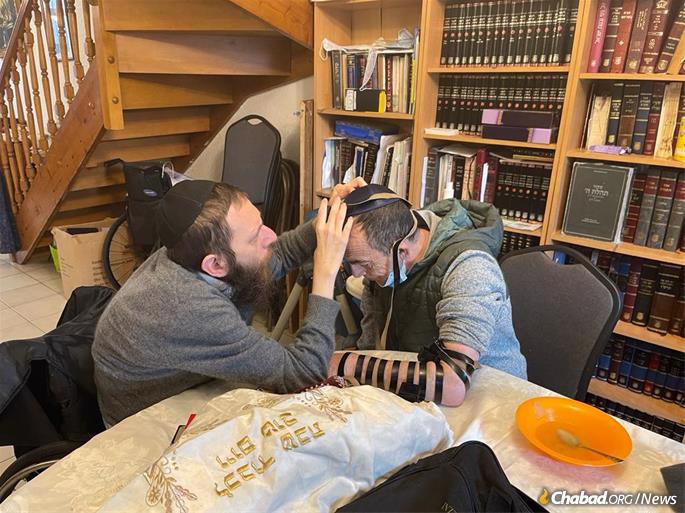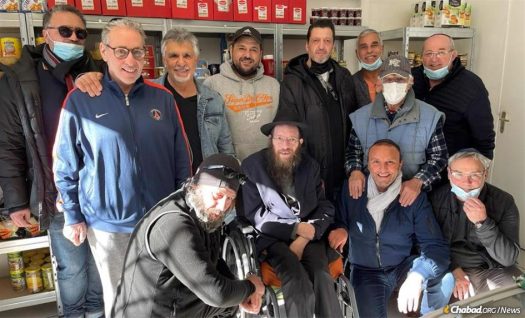
Obituary: Rabbi Mottel Pevzner, 41, Overcame Challenges With Humor and Joy
by Menachem Posner- chabad.org
Located on France’s southernmost Mediterranean coast, only a few kilometers north of the Spanish border, Perpignan has a minuscule Jewish community of just a few hundred souls. Yet for the past 16 years, they were blessed to be served by a spiritual giant, Rabbi Chaim Mordechai Pevzner, who passed away at the age of 41 on the day before Yom Kippur.
Having lived a lifetime of physical challenges—especially during his final three years when a tumor robbed him of the ability to walk—he continued to faithfully serve his community, taking buses, trains and any other wheelchair-accessible route to the Jewish individuals and families he had discovered over the years.
Known as “Mottel,” he was born in 1980 in Paris to Rabbi Yoseph Y. and Rivka Pevzner, longtime Chabad-Lubavitch emissaries to the city.
When he was three years old, he was struck by meningitis and lay in a coma for two weeks. The doctors cautioned his parents to stop praying for his recovery, saying that even if he miraculously survived, he would remain bedridden for life.
When the family notified the Rebbe—Rabbi Menachem M. Schneerson, of righteous memory—he responded with a blessing and instructions that a Tanya should be printed in the building where the family lived.
Miraculously, young Mottel woke up, and within a few days was reciting Torah verses.
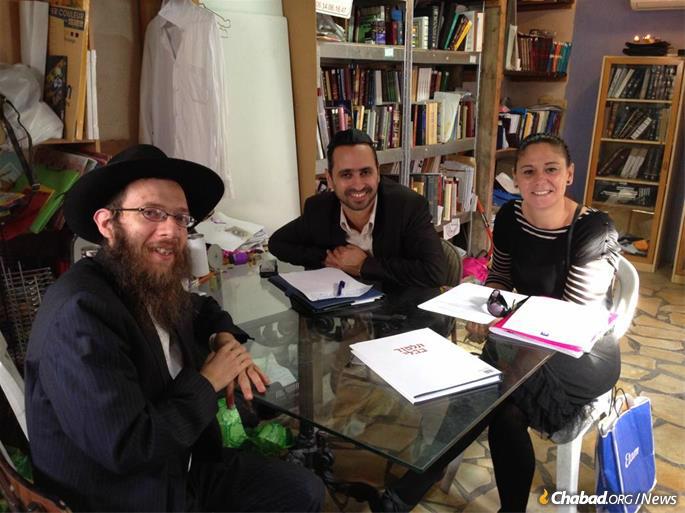
“He had to go through hours of physical therapy, but he never complained,” says his father, director of Cite de L’Education Sinai. “He was always happy and went out of his way to make sure others were happy as well.”
Friends recall that he relished Torah study, and devoted days and nights to learning from childhood and on. He would frequently publish Torah-themed essays in periodicals published by various yeshivahs, and left behind scholarly notations in dozens of volumes of his well-thumbed library.
He studied at Chabad yeshivahs in Brunoy, France; Brooklyn, N.Y.; and Melbourne, Australia. Breaking through language barriers, the Yiddish- and English-speaking student befriended, inspired and left an indelible mark upon dozens of fellow students, who were attracted to his natural faith, positivity, and impish sense of humor.
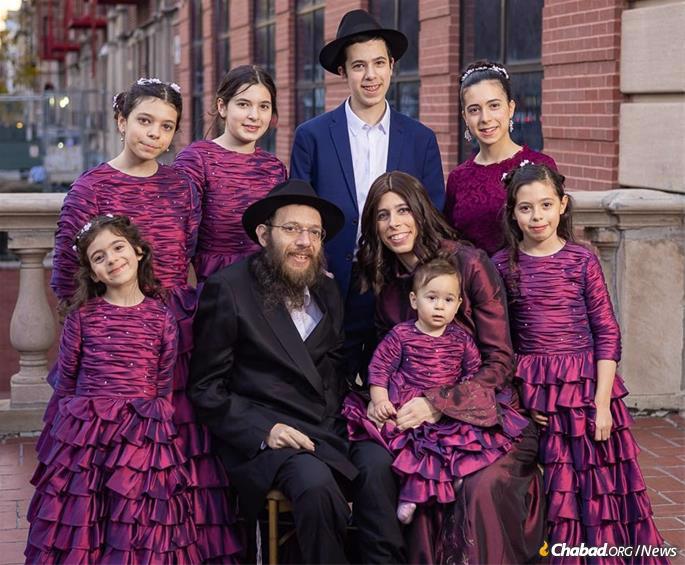
In 2004 he married Rochel Itkin, who grew up as a Chabad emissary in Hamilton, Ontario.
While his lifelong physical challenges would have given him every excuse to take a desk job in Paris, he and his wife chose to set out as emissaries, and they founded Loubavitch à Perpignan in a Jewish community so small and so unique that many doubted that they would be able to “make it.”
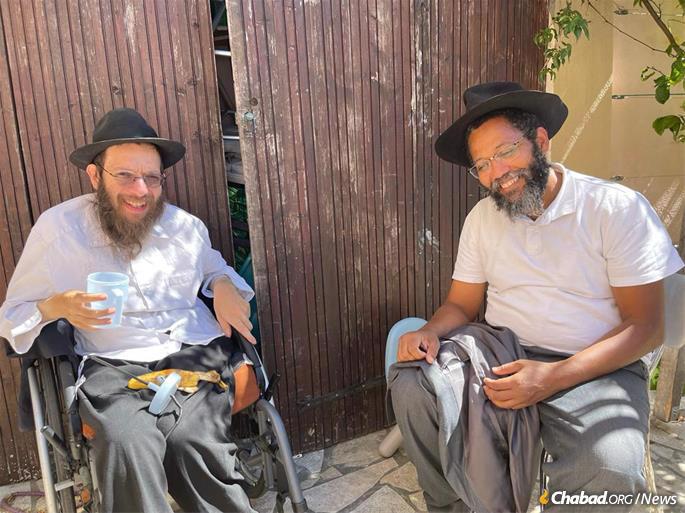
A Perpetual Smile and Abiding Concern for All
People were drawn to the young rabbi with a perpetual smile, who seemed to connect with people wherever he went. In remote towns throughout the French countryside, he had the uncanny knack of “discovering” Jewish families, each of whom had thought they were the only local Jews. He would drive long distances from one mitzvah opportunity to another, treating each person and each encounter with the utmost importance.
He refused to be drawn into communal politics and, as a frequent mediator of conflicts, he would end intense conversations with a sincere declaration, “No matter what you think of me, I love you!”
His devotion to others was extreme. One Passover, he gave away all the matzas he had in his home to a group of strangers spending the holiday in a nearby hotel, and on multiple occasions was seen rushing out of the house in the middle of the night, no matter the weather, to feed, comfort and encourage people in need.
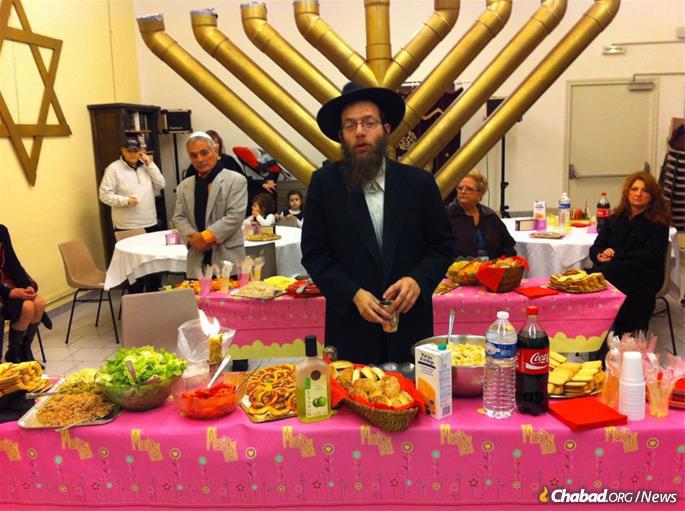
Six years ago, a tumor was discovered in his spine; three years ago, it began to metastasize aggressively, paralyzing him from waist down.
At that point, he made the decision to “defy the Angel of Death” and live even more vigorously and more joyously than ever before, both as a communal servant and as a family man.
No distance was too far and no person was beyond redemption for the blond-bearded rabbi, who was seen scooting around in his motorized wheelchair in towns dozens of kilometers away from home, visiting the Jews whom he continued to draw out of the woodwork.
His wife recalls a recent phone call from a Jew in a local hospital requesting food. The rabbi, then suffering severe pain, wheeled himself there in the rain, only to meet a somewhat abashed man who seemed to be in far better health than he was.
Blessed with a prodigious memory and a natural love for others, he would remember people’s birthdays and anniversaries, the names of their family members and other key details, and was eager to share good wishes and blessings in advance of their milestones.

Living far from an established Jewish community, the Pevzner’s seven children—the youngest of whom is two years old—all spent the lion’s share of their youth being educated at home, with the older ones attending the Shluchim Online School.
“He was devoted and loving towards his children,” recalls his father. “Even in his most difficult times, he set aside time to study with each child individually.”
Recognizing that his end was imminent, the rabbi made it clear that he wished to be laid to rest in his adopted hometown, Perpignan, as opposed to Jerusalem together with family members, including his beloved brother Schneur Zalman, who passed away in 2005 at the age of 22.
He was conscious of his responsibilities to Perpignan to the last. Just days before his passing he secured a commitment from Rabbi and Mrs. Shmuel Bensoussan to become the second Chabad emissaries to Perpignan.
Then and only then, did he finally succumb to illness, passing away on the morning before Yom Kippur 5783.
True to his wishes, the funeral was held in Perpignan that very same day, with a huge crowd of mourners, each of whom felt he or she had lost a best friend—and indeed, they had.
In addition to his parents and his wife, he is survived by children Mendel, Minda, Chaya Mushka, Perel, Dina, Leah and Neshi; siblings Nechama Dina Bluming, Menachem Mendel Pevzner, Avraham Baruch Pevzner, Alti Majesky, Chaya Mushka Piekarski, Chani Silver and Arye Pevzner.
This article has been republished with permission from chabad.org
